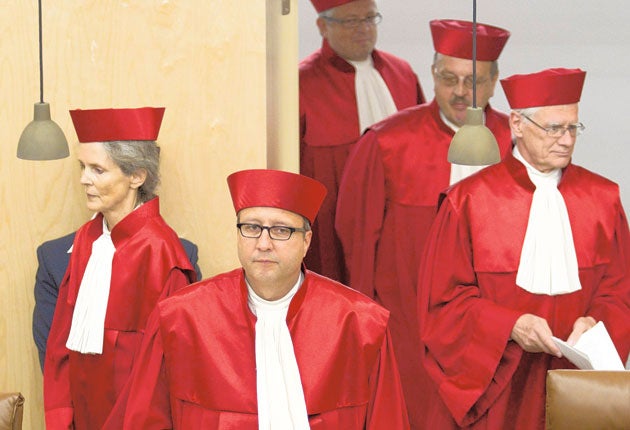Merkel stands firm on eurozone bailouts after backing from court

Chancellor Angela Merkel brushed aside opposition to her government's support for eurozone bailouts yesterday, claiming that Europe would "fail" without the single currency and insisted that Germany's highest court fully vindicated her position.
Ms Merkel's attempt to defend her government's unpopular backing for rescue packages for Greece, Portugal and Ireland came only hours after the Federal Constitutional Court threw out a challenge to eurozone bailouts and ruled that they were legal.
With the Chancellor already facing widespread, public dissatisfaction over her government's handling of the euro crisis and a looming backbench revolt over the issue from MPs in her coalition, yesterday's court ruling was clearly more than welcome.
"The course taken by the government in the current debt crisis has been absolutely confirmed this morning by the Constitutional Court," Ms Merkel told parliament. "The euro is much more than a currency, it is the guarantor of European unity. If the euro fails, so will Europe."
Yet despite the Karlsruhe court's decision to uphold the legality of eurozone rescue packages, judges also ruled that parliament should be more involved in future bailout decisions.
"Our judgment is not a blank cheque for additional rescue packages," said Andreas Vosskuhle, the presiding judge.
Legal experts have warned that additional parliamentary involvement could further impede the speed of Europe's response to the debt crisis which has already been criticised for being too slow.
In a decision which appeared to rule out the concept of eurobonds – an idea favoured by indebted EU member states – the court rejected the possibility of pooling the debt of European countries. Ms Merkel later endorsed her previous opposition to the idea, saying they were the "wrong answer".
However, Ms Merkel faces her biggest domestic political challenge over the euro at the end of this month. On 29 September the Bundestag meets to vote at a special session on cabinet proposals to boost the lending capacity of the European Financial Stability Facility from €250bn (£220bn) to €440bn.
If approved, German guarantees will rise from €123bn to some €211bn. This is despite reservations voiced by several MPs from Ms Merkel's ruling coalition about "throwing good money after bad" by funding eurozone bailouts. Their views are backed by many voters and the country's mass-circulation Bild newspaper.
The performance of Ms Merkel's government has failed to impress voters since her re-election in 2009. Her coalition parties have suffered humiliating defeats in three key state elections this year, largely because of what many see as their inept handling of the euro crisis.
According to a recent poll, 80 per cent of Germans think that the "worst is still to come" in the euro crisis.
Frank Walter Steinmeier, the Social Democrat parliamentary leader, yesterday described the Merkel coalition as "the worst government in decades. It has produced mass disappointment. People don't trust you anymore."
The eurozone debt crisis
January 2010 Greece's budget deficit is found to be four times greater than the maximum allowed under EU rules.
February 2010 The EU asks Greece to make cuts, sparking strikes and riots. Concern grows over Portugal, Spain, Ireland and Italy.
May 2010 The EU and IMF agree a €110bn rescue package for Greece.
November 2010 As the euro weakens, Ireland appeals for help. An €85bn bailout is agreed and the Republic passes its strictest ever budget.
April 2011 Portugal becomes the third eurozone nation to admit it is in crisis. IMF and EU leaders approve a €78bn rescue package.
June 2011 Greece is forced to pass austerity measures to receive the next tranche of its bailout. The eurozone agrees a €109bn package in an attempt to resolve the crisis and stop it spreading.
August 2011 The European Central Bank announces plans to purchase Italian and Spanish bonds. The G7 nations promise to "react" to falls in the global markets.
Subscribe to Independent Premium to bookmark this article
Want to bookmark your favourite articles and stories to read or reference later? Start your Independent Premium subscription today.

Join our commenting forum
Join thought-provoking conversations, follow other Independent readers and see their replies